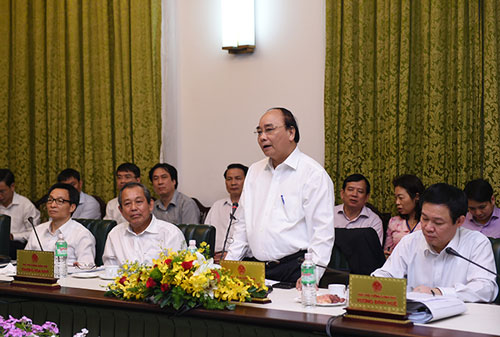|
“The PM is facing unprecedented difficulties”
In the second part of her talks
to VietNamNet, economic expert Pham Chi Lan spoke about the hard work of
Prime Minister Nguyen Xuan Phuc, the inertia of the government apparatus, and
the odd method of GDP calculation of Vietnam, and suggested ways to attract
capital from the people.

Economic expert Pham Chi Lan
Which difficulties is the government
of Prime Minister Nguyen Xuan Phuc facing this term? Public debt,
particularly government debt, has exceeded the safety threshold, or the slow
implementation of the three breakthrough strategies. Have you seen any measure
to promote these?
High public debt is the top challenge that is facing Mr. Phuc and the government. But it is not the responsibility of the government only, but also of the National Assembly because under the Constitution and laws of Vietnam, the National Assembly is the one that makes a decision on the state budget. If the National Assembly was serious in ratifying the state budget estimations and balance, it could have significantly prevented spreading investment and overspending at all levels. More than five years ago, when public investment became a hot issue and when public debt continued to rise, many people were surprised knowing that every year there were more than 300,000 public investment projects in Vietnam. Thus the state did the job of the market and the society, and the number of public investment projects was requested to be cut. The number of people who are paid by the State is high and is increasing, causing budget overspending for regular activities, which currently account for nearly 70% of budget expenditures. These problems were voiced at the National Assembly sessions many times but the situation has not improved much. Therefore, we must say that not only the Prime Minister or the Government, but also the National Assembly and all ministries and local governments have to take responsibility for this situation and must join hands to stop the increase of public debt and public spending. Several years ago, only when the Politburo did not turn a green light for the high-speed rail project, the National Assembly could reject that $56 billion project; otherwise, that huge project would have added weight to Vietnam's public debt burden. The second difficulty is bad debt. We have conducted bank restructuring for five years and it was reported that part of the bad debt was solved in the previous term of the government. However, it turned out that debt was just taken from this bag to another one or from banks to the Vietnam Assets Management Corporation (VAMC). Now it has become a huge problem and we have to deal with the debts sold to VAMC, the existing debt and the due debt. Recent scandals relating to Vietnamese banks show the fact that administration at some banks is very loose and this can cause risks. All those things are becoming a burden for the government of Prime Minister Nguyen Xuan Phuc. The slow implementation of the three groundbreaking strategies is also a major difficulty that the current government has to face. Of these, institutional reform and human resource development have been discussed and put in many resolutions of the Party, the National Assembly and the Government, but the implementation of these resolutions remains stuck. In terms of infrastructure, although a number of large projects have been completed and significantly contributed to the country’s social and economic development, there are still questions about waste, loss of money, or the effectiveness and quality of these works. With all these three strategic breakthroughs, the most important prerequisite is thinking innovation. Surely, the Prime Minister and his government alone cannot bear the entire responsibility for the absence of that factor. But the people are demanding that the party and the state leaders must successfully implement the resolutions of the XI and XII Party Congresses on the three breakthrough strategies to unleash the development path of the country in the coming years. In addition to the three above difficulties, there are also matters that had not previously occurred such as climate change, and severe droughts and salinity in the Mekong Delta partly caused by climate change but mainly due to the flow from upstream blocked by hydropower works built by neighboring countries. The Red River is also facing similar risks. And there are also environmental disasters that have not yet been discovered. I think all of the above issues are a major burden on the shoulders of the Prime Minister and the current Government. When the country has new leaders, the people hope these leaders can improve and promote innovation and can make things better for the country. It is a big gap between hope and faith, which can only filled by action and real results. For Prime Minister Nguyen Xuan Phuc, the people feel that the PM is close to people and listens to the voice of the people. People can see that since he took office, the Prime Minister has been working very hard and focused on dealing with many matters for the people and businesses. At the same time, he has promoted the implementation of significant and strategic tasks such as institutional reform, administrative reform, improving the business environment, business development ... The people also know that the Prime Minister has always sped up the operation of the government apparatus. But obviously, the inertia of the government apparatus is still there, making the distance from commitment to action by the Government is still far. There are things that are not difficult or complicated at all, but the relevant ministries or local governments don’t care or don’t want to deal with; for example, the regulations on checking imported fabric samples or circular 20 on automobile imports. It is worrying that some provinces and cities are competing with each other in raising GDP and budget revenue through attracting investment without paying attention to the environment. How should the PM and his government deal with this situation? From the end of the previous term, Prime Minister Nguyen Tan Dung issued the guidance on the calculation of GDP, under which calculation of GDP of provinces will be gradually removed to have only the national GDP. This guidance is absolutely right, but unfortunately it has not been carried out as expected. Before the 12th National Party Congress, all provinces and cities held their congresses and at all provincial congresses, GDP was considered the most important factor to assess the development and achievement of a province in the five-year term. High GDP growth rates were used to cover weaknesses such as the underdevelopment of agriculture or the slow improvement of living standards. Is this beyond the Prime Minister’s power? Yeah, it may go beyond the PM’s authority but I think the Prime Minister and the Government are those who run the country’s economic powerhouse so they must have a decisive role in changing the old mindset. The National Assembly also plays a significant role in setting the annual and five-year growth targets for the Government. As long as we consider GDP growth as the top goal and the most important indicator to evaluate the operations of the Government and local authorities, without paying attention to how the GDP growth is achieved and at what cost, local governments will still race for GDP. And thus local governments will try their best to entice state and foreign-invested projects by granting enormous incentives, regardless of project effectiveness and environmental pollution. Natural resources and land of many provinces will be exploited to satisfy the addiction to GDP growth. In the world perhaps only Vietnam calculates GDP for each province and considers this as the foundation to evaluate and set development policies for each province. At the same time, provinces take GDP growth as the basis to ask for capital from the central government. Thus, GDP calculation of many provinces was not made based on objective and scientific methods but on the wishes of local officials. For many years, a paradox has occurred in Vietnam – most provinces had much higher GDP growth than the country’s average. Racing for provincial GDP growth target has pushed Vietnam’s institutional systems to fall deeper into fragmentation, since then the budget and national resources are used in a scattered and inefficient manner. This way of resource allocation also leads to the formation of interest groups. When economic and politics interests are intertwined in the government apparatus, the ultimate losers will certainly be people, society and the economy. This term I wish that the Prime Minister and the Government will continue to change the way of calculation of GDP. Indicators of labor productivity, efficient use of resources, environmental protection, and innovative applications of technology, labor training and job creation, improvement of income and living standards of the people, the accessibility and quality of education services, culture, health, sanitation, multidimensional poverty reduction ... should be considered more important than GDP growth rate. The Government must resolutely not attract investment at all costs. Could we replace ODA by the source of capital from the people? 
PM Nguyen Xuan Phuc at a cabinet meeting
Vietnam lacks capital for investment
and development, and apparently needs aid, particularly bilateral assistance
from the outside. But bilateral aid also poses unpredictable dangers such as
appointing contractors or an increase of capital or slow pace of
construction, so ultimately, ODA loans become expensive. The Cat Linh - Ha
Dong urban railway is a typical example. Some said that Vietnam should
attract capital from Vietnamese people; is it feasible?
When Vietnam became a medium-income country, local and international experts discussed the direction that Vietnam would gradually decrease the use of ODA and finally stop using this source, and Vietnam can even become an ODA supplier when it reaches the higher level of development. That is the path that most developed countries experienced. Since 2010, when Vietnam became a low-middle income country, Vietnam has had to borrow ODA loans at higher interest rates, shorter grace period and shorter repayment period. In recent years our country has had to pay more for the ODA loans from the early years of innovation period, and the density of debt payment will continue to rise until 2020. This will account for a very high ratio in budget spending. On the other hand, it is a big problem to use ODA loans effectively. Some provinces mistook ODA as free money so they used this source ineffectively. Regarding domestic sources, I think the source of capital held by the people is huge so the state should find ways to mobilize this source. The best way is to create a good business environment, create transparent channels of capital mobilization to ensure harmony of interests of the parties involved. With the growth of the private sector and increasingly committed openness for foreign companies to participate in projects in our country, including the field of public investment, with the ability to develop public-private partnership (PPP) projects, it is time for the government to count on the new steps, more boldly towards increasing the role of private investors, decrease the role of state investment, to focus on the task of building development strategies, monitor the implementation of investment projects using ODA capital and other sources of loans, overcome the deficiencies of both the state and the market and to ensure efficiency and interests of the people and the economy in these projects. It is also practical preparation for our country after we longer receive ODA. Huynh Phan, VNN |
Thứ Ba, 29 tháng 11, 2016
Đăng ký:
Đăng Nhận xét (Atom)
Không có nhận xét nào:
Đăng nhận xét